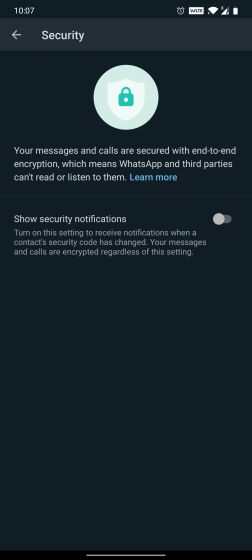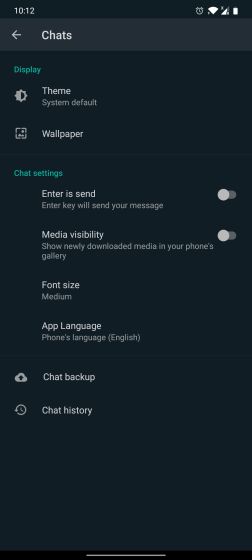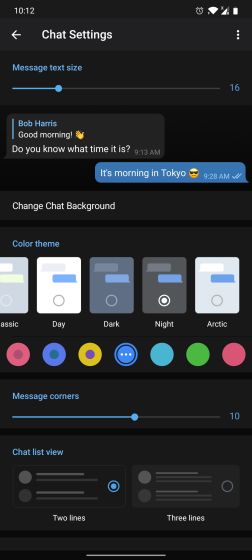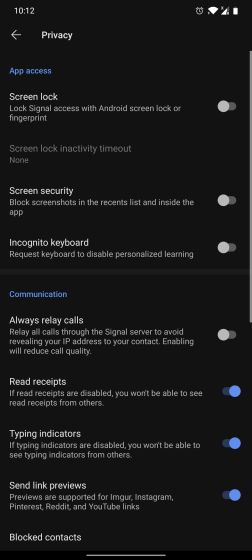Currently, WhatsApp is the largest messaging service in the world with over 2 billion monthly active users. Following that, Telegram accounts for 400 million and Signal stands at a ballpark of 10-20 million monthly active users. Looking at the raw numbers, it’s clear that WhatsApp is wildly popular and almost ubiquitous while Telegram is catching up and Signal seems to have just joined the million downloads race. Having said that, numbers don’t tell you everything and that’s why we bring you a detailed comparison between WhatsApp vs Telegram vs Signal. In this article, we rigorously analyze the security models of all three messaging services and also look at their distinct features. Now with all that said, let’s go through the article and find out who wins this round.
WhatsApp vs Telegram vs Signal: A Rundown
1. Security
WhatsApp
As we all know, WhatsApp is end-to-end encrypted and it’s one of the major messaging services to bring E2E to the masses. And the best part is that the encryption is enabled by default and extends to all forms of communication on WhatsApp, be it messages, audio or video calls, and WhatsApp Web. Having said that, you would be in for a surprise when you discover that WhatsApp uses the encryption protocol developed by Open Whisper Systems — the company behind Signal messenger.
The cryptographic protocol has been named as the Signal protocol and it’s entirely open-source. Further, the protocol has been peer-reviewed by many security researchers and it’s used in other messaging services too such as Skype and Facebook Messenger for optional secret chats.

Apart from that, on the user’s side, WhatsApp now offers a native app locker which is great. Next, you also have the option to enable 2FA on WhatsApp and that’s again commendable. That being said, keep in mind, WhatsApp does not encrypt the backup files (either local or cloud backups).
Also, it does not encrypt the metadata which is used to carry communication between two endpoints. This is one of the major criticisms of WhatsApp’s security model. While metadata does not allow anyone to read your messages, it lets authorities know whom and when you messaged someone and for how long. Anyway, as far as security is concerned, WhatsApp is well-guarded with end-to-end encryption and really outshines most of the competitors.
Telegram
Coming to Telegram, there have been major criticisms around its security model. While Telegram is marketed as an end-to-end messaging service, the fact is that E2E encryption is not enabled by default. Only if you use the “Secret Chat” option then your messages will be transmitted through end-to-end encryption. Meaning messages can only be decrypted on the client’s side. For normal conversations on Telegram, the messages are not E2E encrypted, instead, it uses client-server encryption during transit and at rest.
It means that the messages are encrypted on your device and then they are decrypted on Telegram’s server. Again, the messages are encrypted on the server and sent to the recipient’s device for final decryption. As you can see, in this process, Telegram has the encryption keys on the server-side and can, in theory, access your normal chats.

Other than that, Telegram uses its proprietary encryption protocol (called MTProto) which is a point of major concern. Security researchers believe that using a tried and tested protocol like Signal protocol is a better and far more secure way to implement encryption. Not to mention, MTProto is closed-source so no one can audit and scrutinize Telegram’s server-side code.
Coming to the user’s side of things, Telegram groups don’t support E2E encryption because Secret chat is only meant for individual users. Other than that, if you use the desktop client of Telegram on Windows or Linux then you can’t use Secret Chat. macOS users are covered though. Having said that, the good part is that Telegram offers a built-in passcode lock along with two-step verification.
Signal
Signal is by far the best when it comes to protecting user privacy and it’s miles ahead of both WhatsApp and Telegram. As mentioned above, Signal uses the open-source Signal Protocol to implement end-to-end encryption. And just like WhatsApp, the E2E encryption covers all forms of communication on Signal.
While WhatsApp encrypts messages and calls (and that’s enough for most users), Signal goes one step further and encrypts the metadata too. In order to protect user privacy from all corners, Signal devised a new way to communicate between the sender and the recipient and it’s called Sealed Sender. Basically, with Sealed Sender, no one will be able to know — not even Signal — who is messaging whom, which is amazing.

In addition, you have some incredible privacy features on Signal that is going to make your messaging experience even more private and secure. For instance, you can lock Signal with a passcode or biometrics. Then there is 2FA and an option to block screenshots within the app and the recent screen. And recently Signal added a new feature to blur faces automatically before sending images. That’s cool, right?
Not to mention, Signal by default encrypts all the local files with a 4-digit passphrase. And if you want to create an encrypted local backup then you can do that as well. All in all, in terms of security and privacy protection, Signal stands head and shoulder above WhatsApp and Telegram and that make it the most secure messaging app between the three.
2. Features
WhatsApp
Coming to features, WhatsApp is pretty good and offers all the essential features. You can securely chat with individuals, create a group (up to 256 participants) or broadcast your messages to several contacts at once. In addition to audio calls, WhatsApp now also offers video calls with up to 8 people which is really great.
Apart from that, WhatsApp offers a distinct feature that neither Telegram offers nor Signal. Yes, I am talking WhatsApp Status (also called Stories). Users love this feature as they are able to express their thoughts and feelings to their closed ones. In a way, this makes WhatsApp a social media platform, and not just a messaging service.

Moving ahead, you can share all sorts of files on WhatsApp, and the file size limit is 100MB. You can also share live location with your contacts and I am sure many users find this feature helpful. And since WhatsApp is meant for general users, it offers seamless backup and restore functionality through cloud services like Google Drive and iCloud. And the best part is that cloud backup is completely free. Not to mention, recently dark mode arrived on WhatsApp which is just great. To learn more about its features, you can head over to our article on the best WhatsApp tips and tricks.
Telegram
In terms of features, Telegram is way ahead of WhatsApp and Signal. Telegram is packed with so many features that many find it overwhelming. To start with, you can chat individually and also create groups and channels, similar to WhatsApp. But the main highlight of Telegram is the ability to host close to 200,000 members in a single group which is just mad crazy. Apart from that, Telegram offers many features to manage groups such as polls, quiz, hashtag, bots, and more.
Not to mention, users can upload and host files on Telegram of up to 1.5GB (in contrast, WhatsApp file size limit is just 100MB), which is again bonkers. Other than that, you also have voice calls for individuals. That said, video calling has not arrived yet on Telegram. It might be the only omission, but it’s a big one.

Telegram also comes with a self-destructing timer where you can set a time period and send messages. After the time is up, the message will be automatically deleted from both ends. Furthermore, you can edit sent messages which is usually not found on messaging apps.
Then there are features like message scheduling, ability to send uncompressed media, granular notification management, themes, live location sharing, and much more. Not to forget, Secret chat that allows you to chat with end-to-end encryption. If you want to discover more such features then go through our article on the cool Telegram tricks.
Signal
As Signal is primarily a privacy-oriented messaging service, it falls short on some consumer-friendly features. You do have secure messaging, voice, and video calls and all communications are end-to-end encrypted. Further, you can create groups, but don’t have the option to broadcast messages to multiple contacts at once. Keep in mind, as of now, Signal does not support group video/audio calls.
Nevertheless, you have features such as disappearing messages similar to self-destructing messages of Telegram and the ability to send a one-time viewable image. For me, the best feature of Signal is “Note to Self”. Unlike WhatsApp, you don’t have to create a single-member group to send notes to yourself. On Signal, the feature is available natively and you can jot down your thoughts and ideas while messaging with your friends and family.

Apart from that, Signal allows you to relay voice calls to its servers so your identity remains concealed from your contacts. The feature is somewhat similar to what a VPN does, but Signal offers a built-in option to hide your IP address. Further, you can enable incognito keyboard while typing on Signal, apply dark mode, delete old messages in one stroke, and of course, blur faces and private information from images using its powerful photo editor.
There are also emojis and some privacy stickers, but they are very limited in comparison to WhatsApp and Telegram. All in all, Signal has some of the best privacy features but might fall short for users who want endless customization options. You can learn more about Signal features from our article on the best Signal tips and tricks.
3. Ownership
While that was all about security and features, now we need to discuss the ownership of all three platforms: WhatsApp, Telegram, and Signal. Ownership is important because it allows us to understand how companies are looking to monetize user data and lets you take an informed decision.
WhatsApp
In case you are unaware, WhatsApp is owned by Facebook and many experts believe that WhatsApp could be another platform for Facebook to collect user data behind the scene. So far, there have been many allegations around breaking its encryption and creating a backdoor. And now we are hearing that Facebook will show targeted ads in the form of WhatsApp status, but so far nothing has actualized yet.

A recent report suggests that Facebook has not ditched the plan altogether and in the not-so-distant future, it will show targeted ads to users on WhatsApp. Apart from that, security researchers believe that metadata is an essential piece of information and that is enough for Facebook to track your online behavior. Since the metadata is not encrypted on WhatsApp, you might be risking your privacy on this popular messaging service. Not to forget, Facebook does not have a good reputation when it comes to protecting user privacy as we observed in the Cambridge Analytica data scandal.
Telegram
Coming to Telegram, it was launched in 2013 by Nikolai Durov and his younger brother, Pavel Durov. Both are from Russia and are currently on a self-imposed exile. Pavel Durov was dismissed as CEO of a Russian social-media site after he refused to hand over data of Ukrainian protesters to Russia’s security agencies. Apart from that, on many occasions, Pavel Durov has taken a principled position against censorship and government interference. Looking at the history that geared the development of Telegram, I would say, it does inspire trust. However, the closed-source encryption protocol and optional E2E support leave the room for more transparency and improvement.

Signal
Finally, Signal is owned by the nonprofit Signal Foundation which is run by cryptographer Moxie Marlinspike and Brian Acton. Moxie Marlinspike used to run Open Whisper Systems — the brainchild behind the Signal protocol. After he met Brian Acton in 2018, they formed a new alliance called Signal Foundation which now wholly funds the development of Signal messenger. You shouldn’t miss the fact that Brian Acton was the co-founder of WhatsApp, but he left the company 3 years after Facebook acquired it.

Now, he oversees the development of Signal along with Moxie Marlinspike. Signal has been endorsed by many high-flying people including Edward Snowden, the American whistleblower; Jack Dorsey, the CEO of Twitter, and more. In addition, Signal has received top scores on the EFF’s Secure Messaging Scorecard making it the most secure messaging platform.
The Verdict: WhatsApp vs Telegram vs Signal
As we went through all the points, it’s clear that Signal is a highly-secure messaging service and much better than WhatsApp and Telegram. However, WhatsApp is not far either as it supports end-to-end encryption and also brings some great consumer-oriented features. The lingering issue with WhatsApp is its association with Facebook that may affect the messaging experience in the coming days.
Lastly, Telegram is not the best in terms of security, but it does offer you optional encrypted messaging and you have to be aware of the many features it offers. Other than that, the endless features Telegram offers are simply incomparable and a treat to users and group admins.
To sum up, in the end, you have to make the final decision balancing your privacy and feature needs. Personally, I would pick WhatsApp as long as Facebook stays away from making any major changes. But I would be the first one to jump ship to Signal the day Facebook goes overboard.

Post a Comment